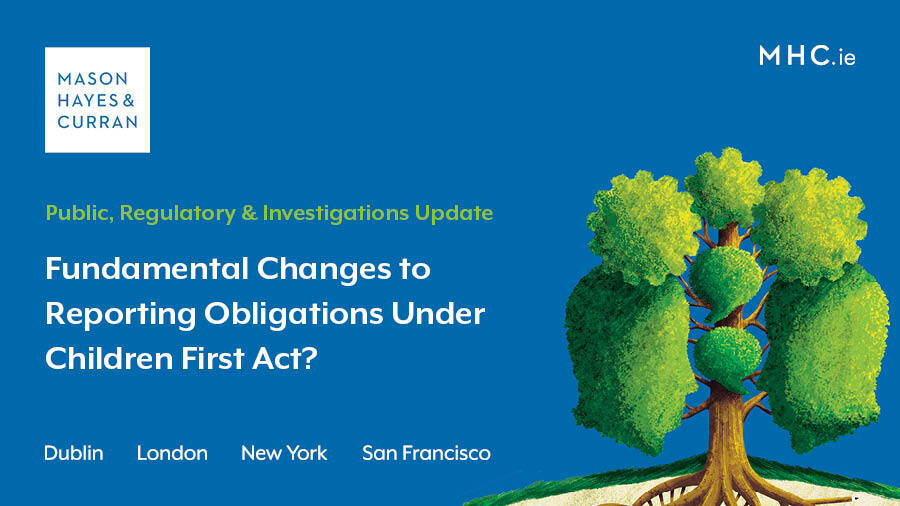Fundamental Changes to Reporting Obligations Under Children First Act?
Recent Court of Appeal judgment to impact mandated persons

A recent Court of Appeal decision signals a fundamental change in approach to reporting obligations by mandated persons to the Child and Family Agency (Tusla). Our Public, Regulatory & Investigations team reviews the implications of the judgment for mandated persons.
The Court of Appeal was asked to consider whether mandated persons who receive disclosures of historic sexual abuse are required to report the abuse to the Child and Family Agency (Tusla), where the disclosing individual is now an adult. The definition of “mandated person” is broad. It includes:
- Registered medical practitioners
- Registered nurses
- Dentists
- Social workers
- Physiotherapists
- Psychologists
- Psychotherapists
- Teachers, and
- Members of An Garda Síochána.
Therefore, the December 2023 judgment[1] will have implications for a wide range of persons who report to Tusla under the Children First Act 2015 (the 2015 Act).
In its judgment, the Court of Appeal disagreed with the High Court’s view that the 2015 Act requires mandated persons to notify Tusla when an adult discloses past harm suffered as a child. The Court of Appeal considered that there is no ambiguity about who is a “child”. In its view, it refers only to a child as defined in the Child Care Act 1991 (the 1991 Act), at the time that the mandated person receives or becomes aware of the disclosure of abuse.
Background
The case arose as a result of guidelines issued by the HSE (HSE Child Protection and Welfare Policy) (HSE Policy) which stated that:
“Service users should be informed at the outset of contact with a service, as appropriate, that if any child protection issues arise, including disclosures of retrospective abuse, that this information must be passed on to Tusla where there are reasonable grounds for concern that abuse occurred, as there may be a current or potential risk to children (identifiable or not)”. (emphasis added)
The National Counselling Service (NCS) subsequently published a document called Proposal for Implementation of the HSE Child Protection and Welfare Policy in the National Counselling Service (the Proposal). This document expressed concerns that counsellors were required by the HSE Policy to report information received from adults about incidents of abuse in their childhood. The NCS viewed this as likely to give rise to vulnerable individuals being reluctant to participate in counselling, for fear of the disclosure requirement. NCS considered that this requirement also posed an increased risk to children because, due to the requirement to report, fewer adults would avail of NCS counselling services, and this in turn would (according to NCS) inevitably reduce the extent of existing reporting of historic childhood abuse to Tusla, rather than increase it.
The HSE was concerned that the Proposal did not properly reflect the obligations created by section 14(1)(a) of the 2015 Act. The HSE then published an interim standard operating procedure (ISOP) to guide NCS staff on the operation of the Policy. The ISOP stated that the position adopted by the NCS in the Proposal was not compliant with the Policy and set out an updated procedure for counsellors and therapists in cases involving new client referrals.
The Court of Appeal judgment
The Court of Appeal held that as a matter of ordinary grammar, the “child” referred to in section 14(1) of the 2015 Act cannot be interpreted to include an adult who suffered harm as a child. The Court also considered whether its interpretation of the relevant section of the 2015 Act undermined an identifiable legislative intent and found that it did not.
The Court of Appeal referenced the judgment in Heather Hill Management Company CLG & McGoldrick v An Bord Pleanála, Burkeway Homes Limited and the Attorney General[2]. It said that, in the present case, it might be argued that the trial judge erred in holding that “… absent a constitutional challenge, the Court cannot depart from the application of the legislation derived from a literal interpretation of that legislation...”
The judgment also set out that to require mandatory reporting of historic harm would amount to a significant change in the law. The Court of Appeal considered that if that was the intention of the Oireachtas, it could be reasonably expected that it would have been clearly expressed, rather than that the intention should have to be “gleaned by a strained exercise of statutory interpretation”.
The judgment fundamentally alters the current position regarding the obligations of mandated persons when faced with disclosures of past child abuse about or from individuals who are now adults. The Court of Appeal found the following:
- There is no ambiguity about who is a “child” as the word is used in the phrase “a child … has been harmed”, as that phrase appears in section14(1)(a) of the 2015 Act. It refers only to an individual who, at the time that the mandated person receives, acquires or becomes aware of the information referred to in the section, is a child as defined in the 1991 Act. Therefore it cannot include persons over the age of 18.
- The trial judge mistakenly concluded that section14(1)(a) of the 2015 Act requires mandated persons to notify Tusla where an adult discloses past harm suffered as a child, where that harm falls within the definition of “harm” as set out in section 2 of the 2015 Act.
- This interpretation of section14(1)(a) is consistent with the 2015 Act as a whole and does not give rise to any anomaly or absurdity, nor is it undermining of the legislative intention to protect children.
- Mandated persons are still obligated to report any reasonably held suspicions that someone who is still a child, ie under the age of 18, is at risk of harm.
Implications
For years, the approach which organisations and mandated individuals have taken to ensure compliance with section 14(1)(a) of the 2015 Act has been to treat any disclosure of past childhood abuse as a matter which requires mandatory reporting to Tusla, even when the person making the disclosure is now an adult.
Conclusion
The Court of Appeal’s finding that there is no mandatory obligation to report child abuse to Tusla when the individual is now an adult marks a fundamental change in practice for mandated persons. To date, organisations and mandated individuals have been reporting disclosures of this nature as a matter of course.
The Court of Appeal considered that the orders sought in the proceedings were too wide, as they could result, unnecessarily, in the quashing of the Policy as a whole. The parties were therefore invited to agree on the appropriate form of order. If they were unable to reach an agreement, the parties were required to inform the Court so that it could reconvene to hear submissions on the most appropriate form of order.
The deadline for appeal to the Supreme Court generally expires 21 days following the order. Given the judgment is dated 8 December 2023, the timeline in the ordinary course of events would likely have expired in late December 2023 or early January 2024. Since the status of the agreement and/or order between the parties is unknown, it is not yet clear whether the judgment will be appealed to the Supreme Court.
If the decision is not appealed, it will give rise to changes in reporting obligations under the 2015 Act. These changes mean that there is no statutory requirement for mandated persons to report childhood abuse to Tusla, where the person the subject of the alleged abuse is now an adult. However, there continues to be a statutory obligation on mandated persons to report any reasonably held suspicions that a child under the age of 18 is at risk of harm.
If you would like further information about the judgment or your reporting and child safeguarding obligations, please contact a member of our Public, Regulatory & Investigations team.
The content of this article is provided for information purposes only and does not constitute legal or other advice.
[1] McGrath v HSE [2023] IECA 298
[2] [2022] IESC 43l
Share this:





